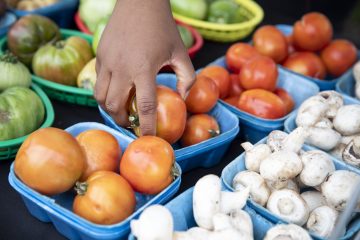Story
Community in Charge
Appetite for Change is fostering a movement to put the North Minneapolis population in control of its food spaces
DATE
June 25, 2020

by Mecca Bos
Photography by Ackerman + Gruber
When Alona Henderson was a little girl, her grandmother cooked food for three buildings within the housing projects they called home on the South Side of Chicago. Henderson ran the plates of macaroni and cheese, collard greens and scratch-made cakes up and down the stairs and collected the money.
By the time she was 10, Henderson was juggling far more than deliveries. Her responsibilities expanded to caring for her sickly grandmother by doing the cooking, giving grandma her meds and paying the bills. In 2006, at the age of 20, Henderson moved to Minnesota to find a better life, and respect for her cooking prowess followed. “I kept hearing this: ‘You need to do it’,” she says.
A turning point came when Henderson connected with the Minneapolis-based nonprofit Appetite for Change (AFC). AFC was founded in 2012 by a trio of women — Princess Haley (formerly Titus), Michelle Horovitz and LaTasha Powell — who sought to use food as a tool for “health, wealth and social change” in North Minneapolis. While that mission has not changed, a movement has emerged from the effort: putting diverse communities — and Black women, in particular — in charge of their own food spaces, a powerful vision from which countless positive outcomes can follow.
Through engagement with the Northside Food Business Incubator program, an AFC partnership with the North Minneapolis-based nonprofit Northside Economic Opportunity Network (NEON), Henderson was able to launch Royalty Soul Food & Catering. Within days, she had her business license, the start of a business plan and access to a professional kitchen. She could take catering orders and do pop-ups for her new enterprise.
Her dream is to pick up her grandmother’s torch and cook fresh and healthy takeout meals daily for working Northside families. “People need healthy, traditional food daily — not just once in a while,” she says.
Henderson hopes to open the Black-owned-and-operated storefront in North Minneapolis. “This is not something I’m just jumping into,” she says. “This is something that’s been bred into me through my bloodline.”
The Secret Sauce: Community-Led Solutions
AFC founders Haley, Powell and Horovitz came from different backgrounds, but they believed in the power of food as a change agent in North Minneapolis — which was high on fast food, low on affordable healthy meal options.
“Food is what brings the family together,” Horovitz says. “That’s bringing people together around a table to eat and talk, not eating McDonald’s in the car together.” Children and young adults who regularly eat family dinners perform better in school, develop healthier diets and have a wide range of mental health benefits, according to several scientific studies.
After growing up on the tough South Side of Chicago and relocating to Minneapolis, Haley lost a son when a stray bullet from gang-related violence hit him in 2010. She and Powell, a lifelong Northside resident, wanted to provide positive options for other area youth, including their own children.
Horovitz’s father grew up in North Minneapolis. After working as a public defender and line cook in Miami, she moved back in 2010 and was eager to reconnect with the community — respectfully.
They asked the neighborhood to join them, over food and cooking, to discuss how they would like to see the Northside’s food landscape change. Haley says this is how any real work gets done in the Black community. The elders, women and youth all came together to talk and to be heard. That’s their “secret sauce,” she says.
From those initial community meetings, Appetite for Change was born. Now, AFC offers a bevy of community-led programs and opportunities, including cooking workshops, urban farms, commercial kitchen space for food entrepreneurs, catering and dine-in restaurants. Throughout all their initiatives, AFC has developed a holistic food system that spans production, processing, distribution, access and consumption. For example, fruit and vegetables planted and grown by local staff and youth in AFC’s seven North Minneapolis urban gardens end up at the AFC-operated West Broadway Farmers Market and in the program’s commercial food businesses. As they’ve grown, AFC has kept coming back to their community for feedback and input.
In 2017, AFC’s innovative work was recognized with a Bush Prize for Community Innovation. With Bush Prize funds, AFC added more space for indoor urban agriculture, a youth staff office and more space for the rest of the staff. They also made improvements at their Northside-based Breaking Bread Café. “The Bush Prize has allowed AFC to invest in our long-term sustainability while improving our impact in the community,” Horovitz says.
“The growth has been divine,” Haley says. “We went from sitting on the floor of the Jordan Area Community Council to being in the business section of the newspaper. The initial engagement of the community really caused an organic response that shifted the culture of North Minneapolis. Now the people who are being disproportionately impacted [by social and economic disparities] are the ones solving their own problems.”
Rooted and Rising in North Minneapolis
When LaTaijah Powell, daughter of AFC co-founder LaTasha Powell, thinks about growing up with a nurturing family in North Minneapolis, she sees a beautiful place and a beautiful community. And she’s not alone: the area has parks, tree-lined streets and a vibrant artistic history that once saw native son Prince play his first solo concert at the Capri Theater on West Broadway Avenue. However, she grew to understand that “Not everybody thinks of North Minneapolis as a beautiful place.”
Even as a child, LaTaijah knew her neighborhood was missing things that other communities take for granted. “We did not have one restaurant where you could go and sit down where people who look like you are cooking and serving your food,” she says. “A lot of people are standing on the corner and don’t have a safe space.”
By many metrics, North Minneapolis (composed of six neighborhoods that are officially known as Near North) has unique challenges. The Twin Cities metro area ranks among the worst nationwide for racial disparities between white and Black residents. Nearly half of Near North’s population of about 35,000 people are Black — compared to just 13.4% of Hennepin County, encompassing Minneapolis and nearby suburbs. Census data shows that Near North has higher unemployment rates, and lower graduation rates and median household incomes, than other parts of the metro area. What’s more, “In the city of Minneapolis, 75% of our shooting victims are African-Americans,” Minneapolis Police Chief Medaria Arradondo said at a 2018 city council committee meeting. “It’s a public health crisis, quite frankly.”
Add a history of systemic disinvestment, segregation, gentrification and corresponding traumas to all of the above. With complex challenges, complex solutions must be explored.
Now in her early 20s, LaTaijah can see her childhood home from the windows of AFC’s West Broadway headquarters. Currently an evaluation specialist and program facilitator, she has worked at AFC since its inception.
When well-intentioned support efforts from outside of the community come in, she says, they often miss an important piece: they forget to listen. “Like, they have all this stuff they wanted to do for youth,” she says. “But there wasn’t any youth involved. The culture here is different. A lot of people don’t really understand that.”
Appetite for Change’s Youth Training and Opportunities Program provides peer-led opportunities to work in the garden, the kitchen and even in the recording studio as a part of the music collective AFC Urban Youth.
A 2016 hip-hop song and music video produced by AFC youth, “Grow Food,” went viral, racking up more than a half million views to date. “See in my hood, there ain’t really much to eat / Popeye’s on the corner, McDonald’s right across the street / All this talk about guns, and the drugs, pretty serious / But look at what they’re feeding y’all — that’s what’s really killing us,” goes the opening rhyme.
“Every day I come in here, there is a kid with a new idea,” says Ieshia Dabbs, AFC’s youth training and opportunities program facilitator. “A lot of them have never had someone in their life to tell them they can prosper. They come in and they talk, and they talk so much. When they come together, it’s a different kind of vibe. We don’t limit ourselves to our failures, but use them to project our success.”
Real Food for Real People
When it came to the formation of another AFC initiative, Breaking Bread Café, Princess Haley offers a story: A youth group arrived one night with no easy answers for dinner. When one of the many fried chicken restaurants that dot West Broadway was suggested, they pushed back, saying “We ain’t eating that s—!”
“They’re passionate,” she recalls. “They went off and they came back with data. They said, ‘There’s 38 fast food restaurants up and down these streets. If there’s a wedding or a funeral, we have to spend money outside of our community for a nicer meal.’”
In 2015, Appetite for Change built a restaurant out of that pushback. On many days the sunny storefront at Breaking Bread thrummed on all cylinders, providing “global comfort food” meals and an environment that was previously lacking in North Minneapolis — a warm third space operated by Black people, for Black people living in the neighborhood.
Biscuit sandwiches and dry-rub chicken with mac and cheese and collards came sailing out, piping hot, as kids zoomed around the courtyard and neighbors gathered for coffee and coconut cornbread. In off hours, its Kindred Kitchen commercial kitchen space offered space for fledgling food entrepreneurs’ pop-ups.
Image
In the summer of 2019, Breaking Bread Café paused its service to restructure its financial sustainability, staffing and overall quality of the dining experience. Due to the COVID-19 pandemic, its reopening was delayed.
In late 2019, Appetite for Change opened a new restaurant, Station 81, inside the Union Depot transportation hub in St. Paul’s Lowertown neighborhood. The menu carries over Breaking Bread’s spirit of healthy, affordable and locally grown ingredients and includes vegetarian and vegan options. It also seeks to provide employment opportunities to underserved populations. During COVID-19, Station 81 has partnered with Second Harvest Heartland’s Minnesota Central Kitchen initiative and produced 1,000 free meals daily for local residents in need.
Along with their dine-in restaurants, AFC offers full-service catering and an on-the-job training program for staff. “Philosophically speaking, food and hospitality improved my quality of life, and I’m interested in providing that to the people I work with,” says Geoffrey Wilson, AFC’s catering director and a North Minneapolis resident. “A lot of people that work for us haven’t gone to culinary school or haven’t worked at, or even eaten at really good restaurants. We’re bringing people to the spaces they might not otherwise have access to.”
Northside Business Growth
“The food business is brutal, and the people who live in North Minneapolis have a lot more obstacles,” says Ann Fix, business advisor/program manager for the Northside Food Business Incubator. The program is part of NEON’s mission to build and support Northside businesses owned by lower-income residents.
And yet, Fix believes growing small businesses is the best way to curb gentrification as developers eye prime Near North land close to Minneapolis’ downtown core. Rising housing prices and new developments signal another uncertain period for the neighborhood that was predominantly Jewish immigrants and their descendants until the middle of the 20th century. By the late ’60s, unrest and riots in North Minneapolis increased and a high percentage of the Jewish population migrated to nearby suburbs.
But who will capitalize on the next round of economic development on the Northside? “Small [Black-owned] business can make a difference and create wealth in our community,” she says “[Those small business owners] are going to hire from within the community and train young people.”
As a response to the few Black-owned businesses in this predominantly Black neighborhood, AFC’s Kindred Kitchen program and NEON co-created the Northside Food Business Incubator in 2016 using funds from a Bush Foundation Community Innovation Grant. The goal was to provide small food businesses with a commercial kitchen to launch or grow their business. To date, Alona Henderson and about 40 others have received “high touch” services through the incubator. When Fix came on, she didn’t realize that incubating small businesses would also be “creating a culture of first-generation entrepreneurship” in North Minneapolis.
As late as the 1940s, Black entrepreneurship was blocked by law in Minnesota, with African Americans being told by government officials that they could only operate “barbecues, shoeshine parlors and barbershops.” Opened in 1949, A.B. Cassius’ Cassius Club Cafe represented the first liquor license and loan granted to a Black business owner in Minnesota. But Cassius was an anomaly. In 2019, the City of Minneapolis joined with nonprofits to host its first Black Business Week. But real societal change needs more public buy-in, according to Fix.
“We are creating some really kick-a– food in North Minneapolis,” she says, wishing foodies and local press would dive in more actively. For example, attending Breaking Bread Café pop-ups — run by Northside Food Business Incubator participants — is a chance to directly support small food businesses in North Minneapolis, she says. Pop-ups allow businesses to test processes and demonstrate that in exchange for a little patience, really innovative ideas might become more permanent. AFC and NEON’s collaboration has evolved to include the New Market, a series of public markets featuring Black-owned food, art, fashion and body product businesses.
Success might initially look a little different than dozens of Black-owned businesses lining West Broadway, which is the dream of many, including Powell: “I want West Broadway to be for Black people the way Plymouth Avenue was for the Jewish people back in the day.”
A Garden Community
Haley says meeting Horovitz and Powell in 2011 was being “invited by the universe to go back to the garden.” The seeds for the mission of AFC were planted. After battling and overcoming her share of life’s challenges, Haley thinks of her journey to AFC as nothing short of a lifesaving divine intervention — one that she is obligated to pay forward.
Appetite for Change now leads Northside Fresh, a coalition of individuals, businesses and organizations that use food as a pathway toward community well-being, economic stability, policy change and social justice.
Northside Fresh provides technical assistance to growers, hosting a farmer’s market on West Broadway, offering seed distribution events and aligning a network of community members, organizations and businesses that have the common goal of building a more self-reliant, just and connected food system on the Northside, all in a culturally sensitive way.
“It is your responsibility to feed your family,” Haley says. “If the food trucks don’t roll in, what are we going to eat?” Relying on the same system that has created problems for the Black community to fix those problems won’t work, she argues. Instead, Haley says it’s a personal duty to teach anyone she meets to sustain themselves outside of that system.
“I can sustain myself for months without having to go to Cub [Foods],” she adds. “I have onions, ginger and garlic, oh my. Mint, sage, basil, and tomatoes. This is how I advance my personal liberation plan.”
Seeds for the Future
“Appetite for Change has made me who I am,” LaTaijah Powell says. “It’s helped me understand that [life] is bigger than here.” Her plans to become a police officer are spurred on by the confidence she’s gained at AFC, which she says expands beyond a focus on food. “We don’t have many places like what we have here. The people who live here need something that’s going to stay, and not gonna leave.”
“I’m more open [since working at AFC],” says Ieshia Dabbs. “I’ll try anything once, at least. Whether it’s gardening, going out to talk to people. Before, you couldn’t pay to me to do it. AFC lets us see Black women in charge. It’s OK to eat vegetables. It’s OK to try something different.”
In December of 2019, AFC Urban Youth released a full-length album titled Trap or Grow. At a release show at the Fine Line Music Cafe in downtown Minneapolis, they performed songs about motivation, growing food and self-love, with songs like “BBQ (Big, Beautiful, Queen)” and “Rethink Your Drink.” A music video for the title track arrived in January.
As North Minneapolis continues its cultural, economic and culinary evolution, so will Appetite for Change. “We’re sailing the ship as we build it,” says Horovitz.
Continue reading
-

News
Power of Bridging event
Mark your calendars for a special community event with john a. powell! Thanks to our friends at MPR News, we'll be hosting john at the Fitzgerald Theater on December 2 and hope you can join us!
-

News
Celebrating the 2025 Bush Prize honorees
Learn more about the 2025 Bush Prize honorees who are helping to make our region better for everyone!
-

News
Welcome to new Bush staff members
We are celebrating some new Bush colleagues and hope you get to meet them soon!